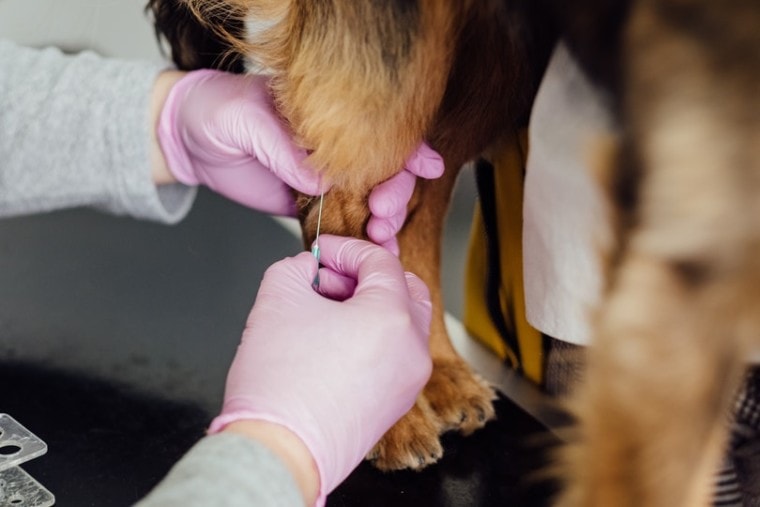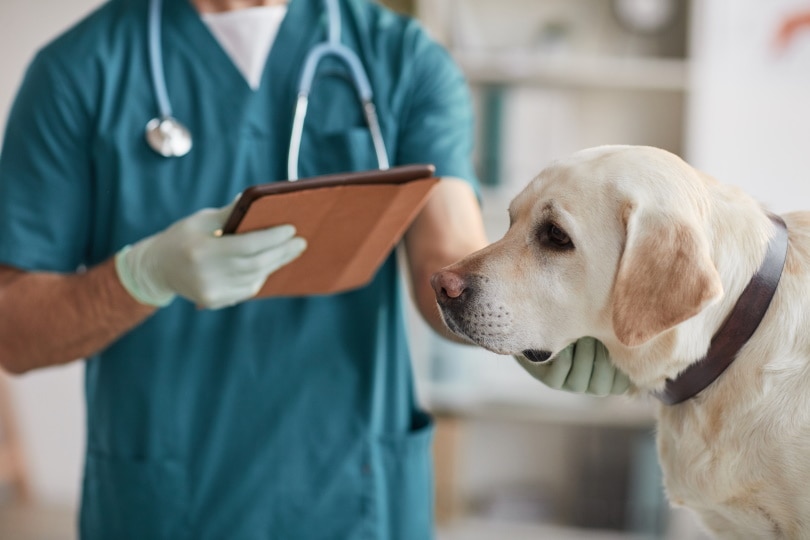
Acupuncture is an ancient Chinese practice with a long history of use in humans and is being increasingly recognized for its ability to improve the quality of life of our canine friends. Acupuncture is typically used alongside other therapies and can offer benefits for a wide range of medical conditions. If you are curious to know more about acupuncture for dogs, this article is for you!
What Is Acupuncture and How Does It Work?
There are different types of acupuncture, but the most common technique used by veterinarians is called dry needling. This is the practice of inserting very thin, sterile needles into specific points (referred to as “acupoints”) on the body to promote healing.
Stimulation of acupoints can produce a variety of physiologic effects, including:
Can Dogs Benefit from Acupuncture?
Is Acupuncture Safe for Dogs?
When performed properly by a qualified veterinary professional, acupuncture in dogs is considered to be very safe.
Are There Any Reasons Not to Use Acupuncture in Dogs?
Acupuncture is not contraindicated in any specific medical conditions in dogs.
However, there are some things to keep in mind before you decide to use acupuncture treatments on your dog.
Acupuncture may not be the best option for dogs that are excessively anxious or aggressive. For these pets, the stress of veterinary visits may outweigh the potential benefits of acupuncture.
Will My Dog Tolerate Acupuncture?
Acupuncture is generally well-tolerated by dogs. Acupuncture needles are incredibly fine, so many dogs do not even notice them being placed. Some dogs become so relaxed during sessions that they even fall asleep!
A few dogs may feel nervous or excited and have a hard time staying still. Your veterinarian may offer food or special treats as a distraction. Occasionally, a natural calming supplement or mild sedative medication may be recommended to help your dog rest quietly during treatment. The goal is for acupuncture to be a positive experience!
Some veterinarians offer mobile services, which is a useful option for dogs that feel more comfortable at home.
What Should I Expect During an Initial Acupuncture Consultation?
Initial consultations often take at least one hour. The veterinarian needs time to thoroughly assess your dog’s health to help ensure they receive the greatest benefit from acupuncture.
After a thorough assessment, the veterinarian will recommend a plan tailored to your dog’s unique needs. Then they will perform the first acupuncture treatment, which typically takes about 20–30 minutes.
How Long Are Follow-Up Acupuncture Appointments?
Follow-up acupuncture appointments are typically shorter than the initial consultation. The veterinarian will ask about your dog’s response to their previous session(s), perform a brief assessment, and administer the acupuncture treatment.
How Many Acupuncture Treatments Will My Dog Need?
Acute injuries may only require a few treatments. Chronic conditions respond best to regular sessions because the benefits of acupuncture can accumulate over time.
Many veterinary acupuncturists advise that it takes at least three sessions to see improvement, although some pets may respond more quickly. Treatments are more frequent initially, usually 1–3 times per week for at least 4 weeks.
If your dog responds well to acupuncture and long-term treatment is recommended, your veterinarian will help you determine the ideal amount of time between treatments to help keep your dog feeling their best. Some dogs continue to do well after reducing visits to every 4–6 weeks, while others may benefit from more frequent sessions. Every dog is different!

How Effective Is Acupuncture for Dogs?
There is some controversy among veterinarians regarding the effectiveness of acupuncture for dogs due to the limited number of clinical studies currently available. However, veterinary acupuncturists and many dog owners believe strongly in the benefits because they have seen results firsthand.
It is challenging to measure the general effectiveness of acupuncture in dogs. Every pet is an individual, signs of improvement may be subjective, and treatment success is defined differently for every patient.
The effectiveness of acupuncture for your dog may be affected by:
Veterinarians Dr. Steve Marsden, Dr. Shawn Messonnier, and Dr. Cheryl Yuill offer some general guidelines, based on their clinical experience, to help pet owners set realistic expectations for acupuncture:
It is also important to remember that acupuncture is often most helpful when used in combination with other forms of therapy rather than as a standalone treatment.
Does Acupuncture Have Any Side Effects on Dogs?
When performed properly by a qualified veterinary professional, acupuncture has very few reported side effects.
Some dogs may feel tired, a little stiff, or sore after an acupuncture session. You may notice minor bleeding or bruising where needles were inserted. Rarely, dogs may experience a worsening of symptoms for a day or two before showing improvement.
If you have any concerns about your dog after an acupuncture treatment, please contact a veterinarian.
How Much Does Acupuncture Cost?
Fees are set by each individual veterinarian to reflect their level of training and experience. The amount of time dedicated to an appointment also factors into cost. In the United States, initial consultations may cost upwards of a few hundred dollars. Follow-up visits are often less expensive.
If you have pet insurance, your provider may have options to help cover the cost of acupuncture for your dog.
How Do I Find a Veterinarian Who Performs Acupuncture?

Veterinary acupuncture should only be performed by a licensed veterinarian who has completed extensive training in this specific therapy. A referral from your regular veterinarian may or may not be required.
To find a certified practitioner near you, you can ask your regular veterinarian for a recommendation or consult one of the directories linked here:
Summary of the Pros and Cons of Acupuncture in Dogs
Acupuncture is worth considering based on its safety and potential to improve quality of life. Your dog may thank you!
You may also be interested in the following:
- L-Carnitine for Dogs: Benefits, Uses & Side Effects
- Yucca Schidigera for Dogs: Benefits, Uses & Side Effects
Featured Image Credit: Freestocksorg, Pexels








